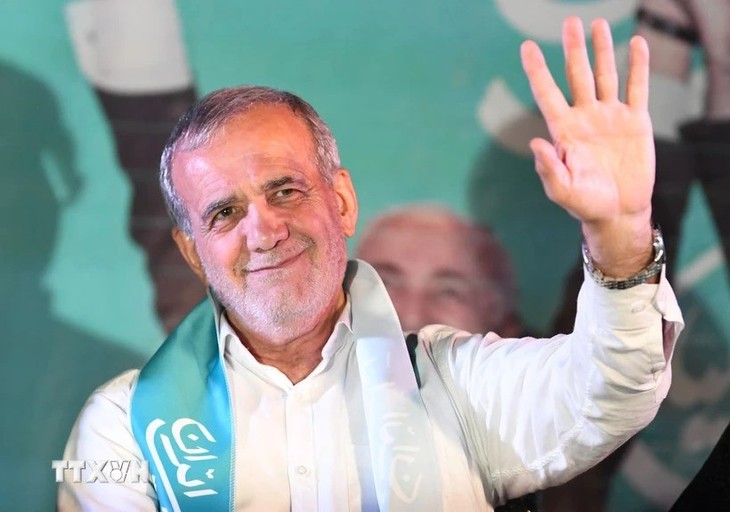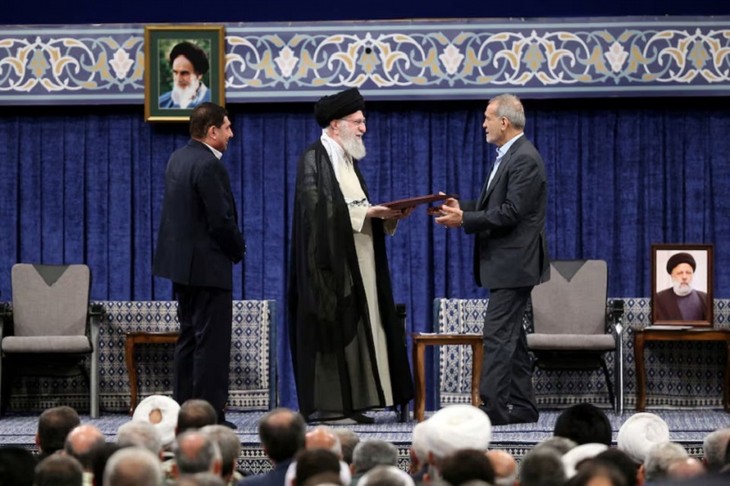(VOVWORLD) -Iran’s newly elected President Masoud Pezeshkian took office on Tuesday. As a relatively progressive politician, the new President is expected to implement positive changes for Iran. He will face many big challenges both domestically and internationally.
 Iran’s newly elected President Masoud Pezeshkian (Photo: Xinhua/VNA) Iran’s newly elected President Masoud Pezeshkian (Photo: Xinhua/VNA) |
69-year-old Masoud Pezeshkian is succeeding Ebrahim Raisi, who died in a helicopter crash on May 19.
Internal challenges
Economic issues are the first major challenge the President will have to handle. After years of prolonged embargoes and sanctions by Western countries related to Iran’s nuclear and ballistic missile programs, its economy is struggling. Although Iran's GDP growth last year reached 5.3% according to the IMF – 5.7% according to Iran’s Statistics Center (3.5% excluding petroleum) – other economic indicators are not so positive.
SCI reported Monday that inflation in July was 32%, causing purchasing power to decline rapidly. Prolonged high inflation for more than two decades has made people's lives difficult and has been seen as a permanent trigger of social unrest.
Immediately after being elected, Pezeshkian declared that handling inflation is one of his most urgent tasks and a measure that should be taken as soon as possible is to increase energy subsidies for poor households, who are most affected by inflation.
Sanctions have taken away Iran’s large oil revenues, even though Iran has one of the largest oil reserves in the world. A lack of revenue makes it difficult for Iran to invest in infrastructure, ensure social security, or obtain external financing and advanced technology.
During the election campaign, President Pezeshkian said the new government should have realistic economic policies. “Many years after the Islamic Revolution, we have failed to keep the promises we made. It’s our biggest problem. Personally, I don't make empty promises. I don't say things that I can't do later,” said Pezeshkian.
Another task will be to reform the civil service apparatus to eliminate corruption and improve poor management, the main causes of the prolonged budget deficit and ineffectiveness of economic policies.
The new President has established a Policy Council consisting of reform-minded politicians and experts led by Mohammad Reza Aref, former Vice President of Iran. Pezeshkian's office issued 18 criteria for cabinet members, focusing on profession, courage, and honesty.
Complicated external environment
President Pezeshkian's economic reforms face greater obstacles with Iran also facing enormous foreign and security challenges. It’s not feasible to resume negotiations with the US on the 2015 nuclear deal in order to ease economic sanctions on Tehran.
On July 9, US National Security Council spokesman John Kirby said the US administration has no intention of returning to the negotiating table with Iran because of Tehran's continued support for anti-US and anti-Israel forces in the region.
 Supreme leader Ayatollah Khamenei formally endorses Masoud Pezeshkian as Iran's President on July 28. (Photo: WANA/Reuters) Supreme leader Ayatollah Khamenei formally endorses Masoud Pezeshkian as Iran's President on July 28. (Photo: WANA/Reuters) |
Alex Vatanka, Director of the Iran Program at the US Middle East Institute, said there’s no chance of a breakthrough in Iran's foreign policy under President Pezeshkian. The real power in Iran belongs to supreme leader Ayatollah Khamenei and the Iranian Islamic Revolutionary Guard Corps, not to the President.
Vatanka said that for the biggest issues, such as what to do with the US, what Iran’s position with Israel, what Iran’s position on the nuclear program, its missile program, regional actions, Pezeshkian has made it clear that those issues will need the involvement of parties.
In his first statements after being elected, Pezeshkian presented similar foreign policy views to his predecessor Ebrahim Raisi, especially regarding the Israel-Hamas conflict in Gaza and the risk of a large-scale conflict between Israel and Hezbollah forces in Lebanon.
Vatanka said time is running out for Iran's new leadership to revive the Iran nuclear deal because the deal will expire in October next year. Iran can hardly expect to break the deadlock until after the US presidential election in November.